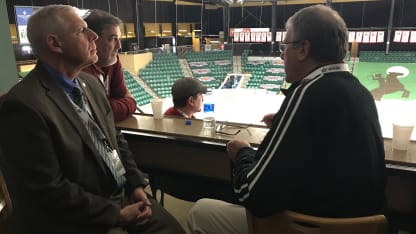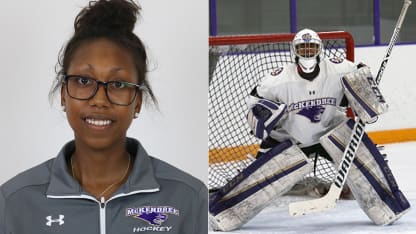ACHA seeks to lose 'club hockey' label at Texas tournament
Men's, women's national championships underway for growing collegiate association

"They hear 'club hockey' and they're, like, 'You just go out there and mess around,' but there's no messing around," she said. "We practice Monday through Friday, we have three 6 a.m. practices, we work out three times a week and we travel for games almost every weekend. We're serious."
Malinowski's Lebanon, Illinois-based team is among the 72 men's and women's teams competing at the American Collegiate Hockey Association National Championships in Frisco, Texas this month.
More than 1,500 players from five ACHA division levels will see action in more than 100 games in the tournament that began March 21 and ends March 31 at the Comerica Center, the Dallas Stars' practice facility, and nearby Children's HealthStar Centers in Plano and McKinney, Texas.
ACHA Executive Director Craig Barnett said the tournament offers a huge showcase to help dispel the perception that the ACHA is a poor cousin to NCAA hockey when it comes to the quality of players and level of competition.
"I like to say it's not club hockey, it's collegiate, non-NCAA hockey," said Barnett, a former goalie in the New York Rangers system who played NCAA hockey at Plattsburgh State University in New York and coached at the University of Findlay in Ohio. "We have ACHA Division I hockey: Very, very competitive national-type programs. National travel, national schedules."

Barnett said the ACHA has benefited talent-wise from youth hockey's growth over the years, particularly in so-called non-traditional U.S. markets like Texas, California and Florida. But those who aspire to play on NCAA teams learn that there are only so many spots on the 60 Division I men's teams and 35 Division I women's programs.
"In this day and time, there are a ton of great hockey players, competitive hockey players that are youth players and junior hockey players and there are just not enough Division I spots," Barnett said. "So where do they go? They go to a school that has what they're looking for academically. They go to schools that have the competitive level of hockey that they're looking for and that's where we come in."
With 531 teams in 48 states and Canada, the ACHA brands itself as a viable path for those who dream of playing or coaching in the NCAA, NHL or other professional leagues.
Arizona State University promoted some players and coach Greg Powers from its ACHA team to the NCAA Division I program that began in 2015-16, and the Sun Devils were selected for the NCAA tournament this season as the No. 3 seed in the Midwest Regional. Penn State University's inaugural 2012-13 NCAA Division I men's hockey team also had players plucked from the school's ACHA team.
Malinowski parlayed a 2018-19 regular season when she was the ACHA's fifth-leading Division I goaltender with a 10-3 record, seven shutouts, a 1.50 goals-against average and a .937 save percentage into a spot on the U.S. team at the 2019 Winter World University Games played in Krasnoyarsk, Russia, earlier this month.
The U.S. women finished fourth in the tournament with a 2-0-1-4 (W-OTW-OL-L) record. Malinowski was the winning goaltender in one of the U.S. victories, a 5-2 win against Switzerland.
Now she is helping lead seventh-ranked McKendree to the ACHA championships tournament for the first time since the university formed the women's team three seasons ago. McKendree faces No. 2 Adrian College of Michigan Wednesday.

Malinowski hopes her tournament performance will help build a resume to get her to the National Women's Hockey League, following in the footsteps of former ACHA players like defensemen Cassie Dunne from Penn State and Paige Harrington, a defenseman who played for the University of Massachusetts Amherst.
"I would love to play in the NWHL," she said. "I don't really want to end my career after college."
Daniel Walcott, a defenseman in the Tampa Bay Lightning organization, began getting noticed by major junior and professional teams in 2012-13 playing for Lindenwood University, an ACHA Division I powerhouse near St. Louis, where he was coached by former NHL defenseman Rick Zombo.
Walcott moved on to Blainville-Boisbriand of the Quebec Major Junior Hockey League following his Lindenwood season and was selected by the New York Rangers in the fifth-round (No. 140) in the 2014 NHL Draft. He was traded to the Lightning on June 1, 2015 for a seventh-round pick in the 2015 NHL Draft.
ACHA teams have also become destinations for former participants in the NHL's Hockey is for Everyone initiative.
Hockey is for Everyone provides support and unique programming to some 30 nonprofit youth hockey organizations across North America, offering youth of all backgrounds the opportunity to play the game at minimum or no cost.
The affiliated programs stress education and teach life lessons through the prism of hockey. The Ed Snider Youth Hockey Foundation in Philadelphia has a "Goals & Assists" program that awards eligible students full or partial scholarships at
participating institutions like West Chester University and Kutztown University which have ACHA teams.
"Hockey will always be a part of their lives, but only just a part, as they continue on their journeys to become productive citizens in our society," Snider Hockey President Scott Tharp said. "The ACHA opportunity gives (students) the same chance to meet and socialize with young people with a similar passion for the sport that helped pave their way to college."
All of this is contributing to an ACHA growth spurt, Barnett said. The number of women's teams has grown from 38 in 2012-13 to 73 in 2018-19. ACHA men's Division I will expand from 60 teams to 72 in 2019-2020 and the association will debut a seven-team Midwest College Hockey conference with teams from Illinois, Iowa, Missouri and Nebraska.
Though the ACHA is on the rise, Barnett and others acknowledge that there is still work to do before the "club hockey" label is permanently peeled off.
"It does have that men's league perception, but that's really not the case," said Lucas Reid, the Stars director of amateur hockey & partnership development. "I went out and watched warmups this morning, I haven't seen an ACHA game in a long time, and I was surprised at the skill level that was on the ice. Some of these guys can play."
Joseph Crump, a Frisco native and freshman forward for the University of Michigan-Dearborn, said the club hockey tag made him skeptical about playing ACHA Division I hockey. Not anymore.
"You can't knock it until you see it, experience it," said Crump, whose Michigan-Dearborn team defeated the University of Oklahoma 6-1 on Friday. "For my friends and buddies that are playing (NCAA) Division III and Division I, I just chuckle and tell them they should try it out."

















